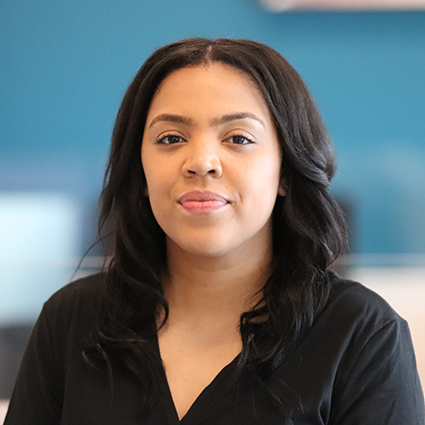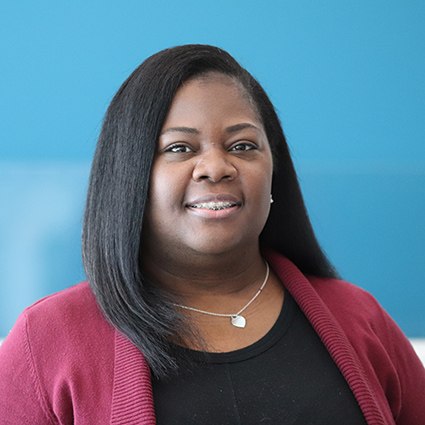As a tribute to Black History Month, members of the Buffett Early Childhood Institute team shared their experiences as Black educators and professionals. Their profiles shed light on how they celebrate and honor Black History Month in their roles and within the early childhood field. We are delighted to showcase their stories below.
Tracy Jones
Program Specialist
As a former Kindergarten and first-grade teacher, my best memories of educating students were introducing them to and sharing similarities with others, such as Black culture. While teaching at a nearly all-white school as the only Black teacher, this was an opportunity for my few Black and brown students to see success in our culture and encourage them during the early years of their educational journey to do their best.
Black and brown students saw someone who looked like them. My white students were able to experience a successful, educated, caring Black individual as their teacher. I also took advantage of Black History Month and introduced the struggles and achievements of past and present Black individuals.
As I continued my teaching career at an all-Black school, sharing that history continued to be one of the highlights of my school year! Black community members came into the school to read to the students each month. Seeing the reactions and excitement of the students experiencing Black readers or Black authors was heartwarming.
In my current role as a program specialist for Buffett Early Childhood Institute, I am honoring Black History Month by connecting one of our North Omaha schools to a guest reader who is a former school librarian! She will share her love of literature, and Black and brown students will experience the love of reading through someone who looks like them!

Keshia Partridge-Nelson
Professional Learning Specialist
In my role at the Buffett Institute and within the early childhood field, I actively recognize and honor the significance of Black History Month—beyond just February. I strive to value and appreciate my own contributions and capabilities whenever I fulfill my professional responsibilities. I use my voice as a Black woman to bring important conversations to the forefront. I advocate for the prioritization of Black perspectives and voices. I believe that fostering inclusivity and promoting diversity in the early childhood field requires actively involving Black professionals from diverse backgrounds. By incorporating Black voices into early childhood education, I aim to create a learning environment that is more representative and inclusive.
Dalhia Lloyd
Director of Professional Learning
For my family and community, the month of February isn't just about dates on a calendar—it is a journey through time, a reminder of the strength of our ancestors, and a celebration of who we are. Family time often consisted of watching documentaries like “Eyes on the Prize” and conversing about my grandparents' migration from the South. These discussions underscored the struggles and triumphs of my own family members. One of my most cherished memories was listening to my uncle's stories from his childhood, which always ended with a reminder that Black history is something to celebrate year-round.
As a Black early childhood professional, I am continually inspired by the richness of our history and culture that shape my personal and professional identity. As I think about the connection between my own experiences and my work, I am reminded that Black history is not confined to the pages of a textbook or walls of a classroom—it is a living, breathing force that permeates every aspect of our lives.
So, I observe Black History Month by paying tribute to the legacies of those who preceded me and those who are forging paths for future generations. I delve into the writings of influential Black women educators like Iheoma Iruka and Stephanie Curenton. I share empowering poems like "Black Girl Magic" by Mahogany Browne that challenge stereotypes about Black girls and women. I celebrate the joys of being a brown-skinned girl by singing along to Beyoncé. I seize every opportunity, not just during Black History Month but throughout the year, to highlight and uplift the experiences of Black children, families, and professionals.

Monica Wells
Family and Community Program Administrator
Growing up in North Omaha, my family and community meant everything to me. My mother would sing gospel songs throughout the house, reminding me to stay rooted in my faith. My neighbors would cheer me on each time I left the house in my cheerleading uniform or joined a new club at school. The owner of the local corner store would give us $5 for each “A” on our report card, and we took our money to our favorite neighborhood restaurant, Time Out Chicken, to order a Big Bob with fries and a strawberry drink. This encouragement, these motivating whispers, traveled alongside me each day I entered the classroom. In my moments of doubt, I knew that I had an entire community cheering me on and my faith to get me through.
I strongly believe that family and community are the bridge to academic and lifetime success. Embracing the families, communities, and culture in which our children represent and grow up in is imperative to their educational success. Learning about their culture, shopping in the stores in their communities, and tasting their favorite foods gives us a glimpse into the world they hold close to their hearts.
Through my work as an early childhood professional, I want to inspire the students and educators I work with to be happy with who they are; encourage them to hold tight to the beliefs, traditions, and history of their family, community, and culture; and empower them every day to work hard in their classrooms.
Strong, authentic relationships between our families, students, and educators are key. We must speak life into our students, cheer them on, teach them the skills, and provide the tools they need to be prepared for the future. We must show examples of the power, importance, and necessity of community.